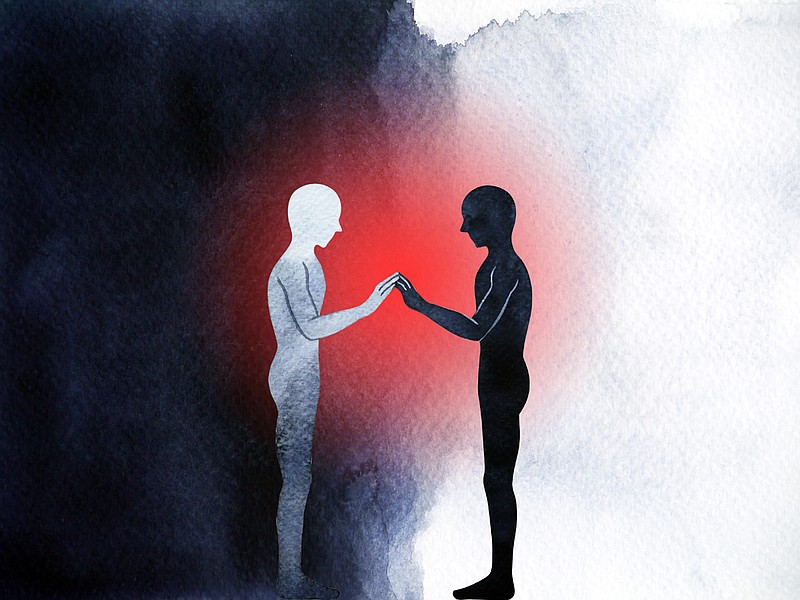I've spent the last few weeks, maybe like a lot of you, scrolling through happy Facebook photos from friends and acquaintances: Final school plays. Graduations. Proms. College decisions.
Here, the posts say, in so many words. Here is my love and labor and unfathomable luck and endless worry and whole heart. Dressed in a gown. Walking across a stage. Finishing something she started. Started something he'll adore. (We hope.)
It's such a beautiful leap of faith.
As consistently as we humans betray each other, disappoint each other, break each other, fail each other, we still feel pulled to share what's precious with each other. To connect our lives to each other's.
That beautiful leap was on my mind last weekend when I drove to a service at the Lake Shore Unitarian Society, about a half-hour north of my home. The group invited me to speak about the power of storytelling, and I was eager to share some of the ways that collecting and telling stories in this job has shaped my understanding of the world.
"Stories simplify the complicated," lay leader Nancy Prial told the congregation. "And they also complicate the simple."
I love that.
I remember when COVID-19 first arrived, I had such a strong desire to talk to people who had lived through times of great difficulty.
We were suddenly, for safety, being encouraged to do life in isolation. Those connections that sustain us could also, suddenly, endanger us.
I was craving perspective and hope, probably. Wisdom. Something to simplify the complicated and complicate the simple.
I ended up interviewing a woman named Wanda Bridgeforth, who was 98 at the time. She had lived through polio, the Great Depression and the Civil Rights Movement. She was 16 when a polio outbreak swept through Chicago in 1937. Schools were closed. Kids learned their lessons through 15-minute segments on participating radio stations.
A good friend of hers contracted polio. She was hospitalized in the basement at a South Shore hospital because she was Black. (Her friend survived and lived to be 80. She walked with a limp.)
Bridgeforth was part of the first class of freshmen at DuSable High School when it opened in Bronzeville in 1935. She knew Nat King Cole when he was just Nat Cole. She knew Dinah Washington as Ruth Jones and Redd Foxx as John Sanford. They were all her classmates.
Her dad was a chemist and moved around the country trying to find work during the Great Depression. Her mom worked as a maid "in-family," which meant living where she kept house. Bridgeforth was left to bounce from home to home. She estimated she moved 40 times as a kid.
But the joyful parts of her life stood out more than the struggles, she told me. Playing tennis in the street after school. Jumping rope while the grown-ups headed to work. Walking to school with all the neighborhood kids. Starring in musicals at school.
A good life doesn't have to mean a life free of hardships, she said.
"I'm not Pollyanna, but find something to be happy about," she told me. "Or if not happy, contented. I feel a lot of times while you're out there struggling to find something great, something else comes along and you miss it because you're so busy looking at the end, at the finish."
Bridgeforth passed away in 2022. She was 101. I've thought about her words countless times, and I shared them with the Unitarian group that day.
When I finished my talk, about the power of stories and the pull of human connection, a woman in the back raised her hand to ask a question. As soon as she started speaking, I got chills.
And when she was done with her question, I asked, "Are you Dr. Orelind?"
And she said, "I used to be. Now I'm Dr. Oldson."
And I said, "You told me I was pregnant with my daughter. You gave me the best news of my life."
She was my general practitioner when I first moved to Chicago. I tried for years to get pregnant. I was in her office one day to hear some other dumb reason for my fatigue and nausea and all the rest and she ran some tests and came back into the little office and said, "Heidi, you're pregnant."
I will never forget her voice. I hadn't heard it in almost 18 years. (She left the practice shortly after that.)
And there she was in the audience. She told me she has followed my work for years and felt some kind of kinship but didn't know why. ("Did we go to college together?") And that day we figured it out.
Her words changed my life. How often do we do that for each other?
The pull of human connection. A beautiful leap of faith. And when we land well, well ... it's everything.
____
Heidi Stevens is a Tribune News Service columnist. You can reach her at [email protected], find her on Twitter @heidistevens13 or join her Heidi Stevens' Balancing Act Facebook group.
____
©2023 Tribune News Service. Distributed by Tribune Content Agency, LLC.

